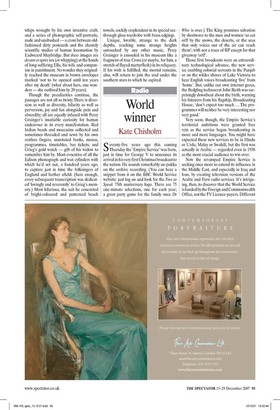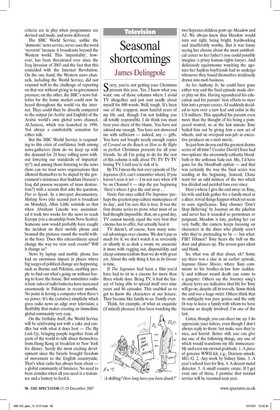World winner
Kate Chisholm eventy-five years ago this coming Thursday the 'Empire Service' was born, just in time for George V to announce its arrival in his very first Christmas broadcast to the nation. He sounds remarkably un-pukka on the archive recording. (You can hear a snippet from it on the BBC World Service website: just log on and look for the Free to Speak 75th anniversary logo. There are 75 one-minute selections, one for each year; a great party game for the family once Dr Who is over.) The King promises salvation by shortwave to the men and women 'so cut orff by the snows, the deserts, or the seas that only voices out of the air can reach them'; with not a trace of RP except for that giveaway 'off'.
Those first broadcasts were an extraordinary technological advance, the new service enabling colonial servants in the Punjab or on the wilder shores of Lake Victoria to hear English voices broadcasting 'live' from 'home'. But, unlike our own internet gurus, the fledgling technocrat John Reith was surprisingly downbeat about the birth, warning his listeners from his flagship, Broadcasting House, 'don't expect too much ... The programmes will neither be very interesting nor very good.'
Very soon, though, the Empire Service's territorial ambitions were granted free rein as the service began broadcasting in more and more languages. You might have expected these new services to be in Hindu or Urdu, Malay or Swahili, but the first was actually in Arabic — regarded even in 1938 as the most crucial audience to win over.
Now the revamped Empire Service is seeking once more to extend its influence in the Middle East, and especially in Iraq and Iran, by creating television versions of the Arabic and Farsi radio services. It's intriguing, then, to discover that the World Service is funded by the Foreign and Commonwealth Office, not the TV Licence-payers. Different criteria are in play when programmes are devised and made, and news delivered.
The BBC World Service, unlike the 'domestic' news service, never uses the word 'terrorist' because it broadcasts beyond the Western world. This 'impartiality', however, has been threatened ever since the Iraq Invasion of 2003 and the fact that this coincided with the Internet Revolution. On the one hand, the Western news channels, including the World Service, did not respond well to the challenge of reporting on that war without giving in to government pressure; on the other, the BBC's news bulletins for the home market could now be heard throughout the world via the internet. They could then be directly compared to the output (in Arabic and English) of the Arabic world's own global news channel, Al-Jazeera, which was launched in 1996. Not always a comfortable sensation for either side.
But the BBC World Service is responding to this crisis of confidence both among news-gatherers (how do we keep up with the demand for 24-hour rolling news without lowering our standards of impartiality?) and among those listening to the news (how can we trust news organisations that allowed themselves to be duped by the government's insistence that Saddam Hussein's Iraq did possess weapons of mass destruction?) with a season that asks the question, Free to Speak. In a two-part documentary, Making News (the second part is broadcast on Monday), Allan Little reminds us that when Abraham Lincoln was assassinated it took two weeks for the news to reach Europe (via a steamship from Nova Scotia). Someone now would probably have caught the incident on their mobile phone and beamed the pictures round the world within the hour. Does this extraordinary speed change the way we view such events? Will it change us?
News by laptop and mobile phone has had an enormous impact in places where big surges of political change are happening, such as Burma and Pakistan, enabling people to find out what's going on without having to leave the house. But sometimes radio is best: sales of radio batteries have increased enormously in Pakistan in recent months. No point in having a computer when there's no power. It's the (relative) simplicity which gives radio news an edge over television; a flexibility that makes creating an immediate global community very easy.
On the birthday itself, the World Service will be celebrating not with a cake and candles but with what it does best — The Big Link-Up, bringing people together from all parts of the world to talk about themselves, from Hong Kong at breakfast to New York for dinner. Surely the most exciting development since the bicycle brought freedom of movement to the English countryside. That's what radio has always been about — a global community of listeners. No need to burn airmiles when all you need is a transistor and a battery to feed it.


































































































 Previous page
Previous page